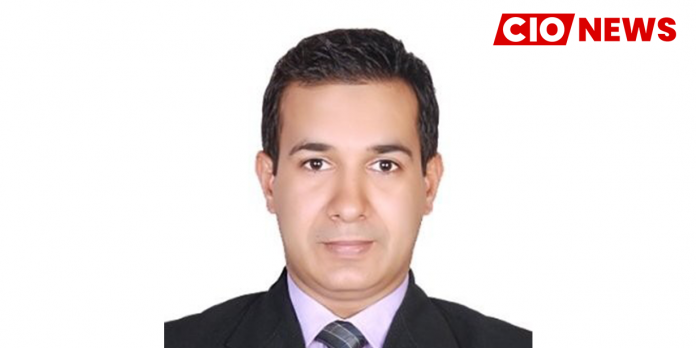
As technology became increasingly important, one of the most important roles that I needed to adapt to was to become a strategic thought partner with the business leaders i.e. moving beyond simply managing IT to leveraging technology to create value for the business
This is an exclusive interview conducted by Santosh Vaswani, Content Writer & Editor at CIO News with Vinay Kumar, Chief Information Officer (CIO) at MMG, on his Professional Journey.
When asked how he planned his career path to be a successful CIO, Vinay Kumar, Chief Information Officer (CIO) at MMG, in an exclusive interview with CIO News, said, technology contribution in business evolved drastically over a period and we as function heads had to upgrade our self with it. Following are the three phases as per me that came on my way on the path of a CIO:
- Information technology (IT) function as technical support
- IT function as a bridge between business and IT
- IT function as a strategic and integrated part of the business
When asked about challenges he faced in his career path and how he overcame them, he said, “When you work in the core sector, your first challenge is to understand the business”. In my case, I am fortunate to have worked in different domains such as Supply Chain, Retail (Bata India Ltd.), Manufacturing (FlaktGroup), FMCG (Pepsi and Coca-Cola), and now QSR (McDonald’s).
Today, customer experience is one of the most defining aspects of businesses today. In 2021 and likely beyond, organizations want to achieve a seamless, cutting-edge digital experience that today’s consumer’s demand.
As technology became increasingly important, one of the most important roles that I needed to adapt to was to become a strategic thought partner with the business leaders i.e. moving beyond simply managing IT to leveraging technology to create value for the business. To give solutions to all different sectors, you need to learn the business requirements and the expectations as it is entirely different from one domain to another. Creating powerful customer experiences, for example, requires data architecture to track and make sense of customer behaviour. To overcome this challenge, I invested a lot of time with functional and business-unit leaders and managers to gain an in-depth understanding of business realities on the ground and go out of my way to develop a nuanced and detailed understanding of customer issues.
When asked about a cyber-attack or a security incident faced by his current organisation and how he tackled it, he said, with such a reliance on technology and technology advances, the methods of exploiting it for nefarious reasons have increased multi-fold. Phishing and ransom-ware are the two biggest security threats faced nowadays.
Although phishing is not a new tactic, how it is carried out has evolved. Similarly, ransom-ware attacks against businesses are also on the rise.
Fortunately, I have never faced any specific cyber-attack in my career. But my first priority has always been security and we have built three layers for the same. First, we keep infrastructure safe with UTM and then endpoint security along with user awareness. As a CIO, I believe security should be a collective effort that cuts across departments. Similar to finance, operations, and legal, information security touch virtually every aspect of the business.
When asked how his organisation geared up in terms of technology in the COVID times, he said, it is really a hard time for any core sector where people have to be physically present for the production and distribution. The impact on the businesses is quite high and there is an inevitable dip in production. The biggest challenge is to manage documentation and goods movement. We have a hybrid setup for our ERP and that is helping our data capturing process offsite. Only a limited number of teams are there at the plant and restaurants to do execution. Bringing new technology and automation into the process is always on priority.
When asked about challenges faced by CIOs today in a similar industry while implementing digital technologies, he said, “I will not say it is a challenge, but at the same time I feel dependency on technology increase in multi-fold”. We as a technology team have to deliver the same in limited time along with SLA as our role is changing from support function to front line that started contributing in revenue.
When asked how CIOs can overcome the challenges faced, he said, for me, I follow two basic fundamental understanding “What” from business and deciding “How”. The more clarity we will have on “What” it will be easy to deliver “How”.
When asked about best practices/industry trends/advice he would like to suggest to fellow CIOs for their successful professional journeys, he said, cloud is the need of this hour, and looking at the current situation, I have started believing more in cloud solutions. This will give us time to invest our time and skill in solution, which will help in driving the business.
He highlighted that the “Key Mantra” for me and we follow is very simple: “Clear Objective, Cooperation, Individual development and respect for each other”. As a lead, I have to build connections between the team and work on their weakness and utilize strengths. Any new candidate, who is going to be a part of our technology team, must have a good attitude and approach, in addition to specific technical skills.
Also read: CIO News interviews Shri Wangki Lowang, Minister (IT) of Arunachal Pradesh
Do Follow: CIO News LinkedIn Account | CIO News Facebook | CIO News Youtube | CIO News Twitter
About us:
CIO News, a proprietary of Mercadeo, produces award-winning content and resources for IT leaders across any industry through print articles and recorded video interviews on topics in the technology sector such as Digital Transformation, Artificial Intelligence (AI), Machine Learning (ML), Cloud, Robotics, Cyber-security, Data, Analytics, SOC, SASE, among other technology topic





